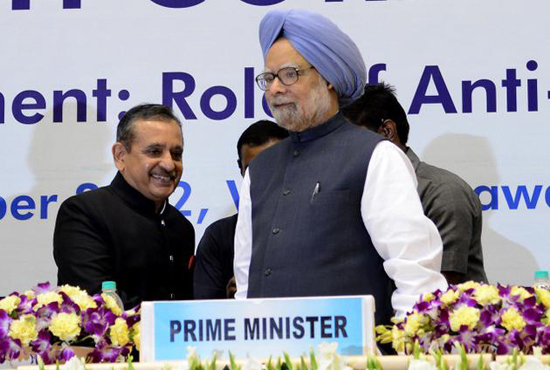
New Delhi, October 10: Prime Minister Manmohan Singh on Wednesday decried creation of “mindless atmosphere of negativity and pessimism” on the corruption issue and promised to strengthen the anti-graft law by including corporate failure to prevent bribery as a new offence besides other steps.
“The mindless atmosphere of negativity and pessimism that is sought to be created over the issue of corruption can do us no good. It can only damage the nation’s image and hit the morale of the executive,” he said.
With his government facing increasing attacks on the corruption issue from the opposition and activists, Dr. Singh said a clear and unambiguous definition of corruption is being sought to be provided through amendments to plug gaps in the Prevention of Corruption Act and bringing it in line with international practices.
Addressing the annual conference of CBI and State Anti-Corruption Bureaux, Dr. Singh said experience has shown that “big ticket corruption” was mostly related to operations by large commercial entities.
“A clear and unambiguous definition for the term ’corruption’, covering both the supply and demand sides, is being sought to be provided,” he said.
Dr. Singh said a proposal is also being mooted to include corporate failure to prevent bribery as a new offence on the supply side. “I would like to stress upon the need to protect honest public servants and keep the morale of the executive intact with our commitment,” he said.
The Prime Minister said amendments in the Act were necessary as the experience has shown that in vast majority of cases, it is difficult to tackle consensual bribery and the supplier of the bribe goes scot-free by taking resort to provisions of the Act.
“This would be taken care of in the proposed amendments...We are also examining how the Act can be amended to protect honest public servants more effectively,” he said.
Dr. Singh said his government was firm in its commitment to do everything possible to ensure probity, transparency and accountability in governance.
“I would like to stress upon the need to protect honest public servants and keep the morale of the executive intact. I have said this in the earlier conferences also, but I think this is something worth repeating,” he said.





Comments
Add new comment